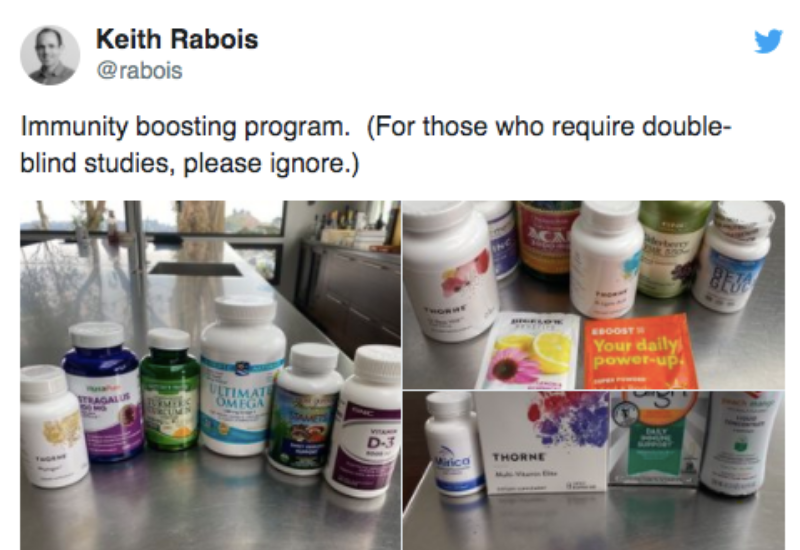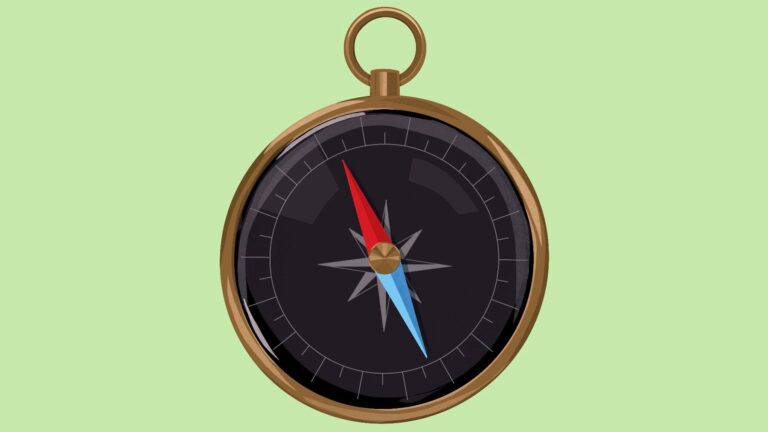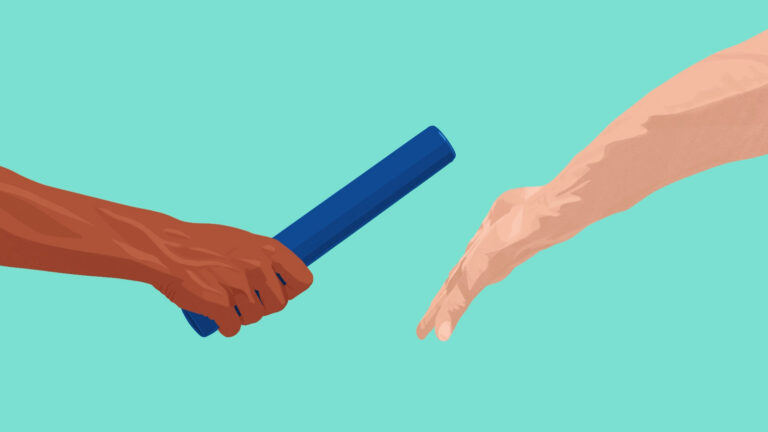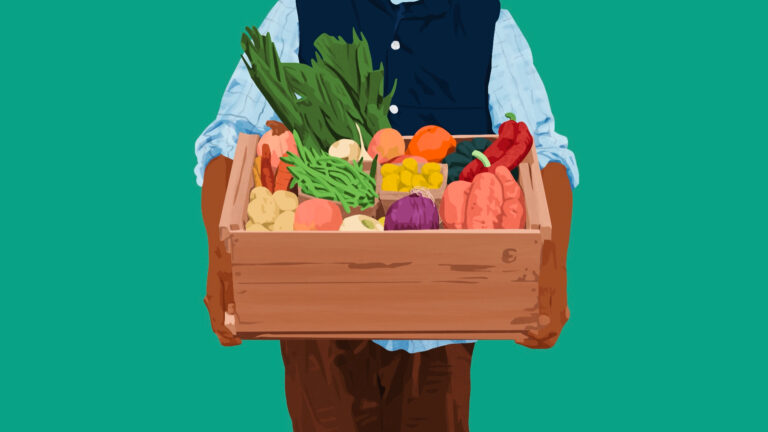In the midst of a pandemic, public health is suffering, but the wellness economy is getting stronger.
What’s happening: Under lockdown, it feels like the entire internet pivoted to wellness. From stress-relieving essential oils to immune-boosting supplements, brands and influencers are seizing the moment.
Why it matters: The wellness industrial complex perpetuates the spread of pseudoscience at the expense of actual science. With anxiety at an all-time high, the line between health and wellness continues to blur.
The big picture: On the other side of quarantine, whenever that is, the wellness industry will emerge stronger than ever before. Meanwhile, despite the supposed self-care boom, most of the population has actually taken a step backward during social distancing.
In Supplements We Trust
As panicked consumers stock up on vitamins, supplements, and flu remedies, health experts are growing increasingly wary of predatory practices.
None of these products have proven effective in fending off the coronavirus or lessening its symptoms, but sales are surging nonetheless:
- Zinc, a remedy for colds, jumped 255%.
- Elderberry, used for immune support, grew 415%.
- Vitamin C, a so-called immune booster, shot up 146%.
- Echinacea, an herb for cold and flu relief, increased 122%.
This run on supplements caused shortages at pharmacies and grocers nationwide. In response, Harris Teeter, a supermarket chain with 230 stores in seven states, was forced to cap sales of Airborne, limiting purchases of the vitamin-packed effervescent tablets to three packages per customer.
In an effort to combat fraudulent advertisements and misleading social media posts, the FDA and FTC sent warning letters to at least seven companies promoting unfounded coronavirus cures like essential oils, elderberry teas, and colloidal silver supplements.
Walk the Line
In a thinly veiled attempt to capitalize on the situation, vitamin and supplement brands have ramped up advertising related to the immune-boosting benefits of their products.
A quick search of Facebook’s ad library—a database of ads running on Facebook, Messenger, Instagram, and Facebook’s audience network—found brands like Moon Juice, GNC, and Care/of pushing the immunity support narrative.
As the pandemic persists, consumers are shifting their spending habits. According to a survey of 2,000 people from North America and the UK, 42% of consumers are now buying health and wellness products online. Of note, more than 21% of survey respondents said they’re buying more vitamins, CBD, and superfoods.
Look to the Sky
Given the ever-expanding definition of wellness, it should come as no surprise to learn that astrology has become a coping mechanism for self-isolating.
As we pointed out in Issue No. 58, astrology has become a lucrative pillar of the wellness industry:
- In 2018, the mystical and psychic services market was valued at $2.2B.
- Nearly 40% of American women read their horoscope at least once a month.
- According to a Pew poll, 29% of Americans believe in astrology.
More recently, as stay-at-home orders went into effect, “astrology coronavirus” became the most popular astrology-related search term between March 22–28. Going a step further, reiki, sound healing, breathwork, and Ayurvedic medicine have all been touted as helping alleviate corona-induced anxiety.
Vice > Virtue
On Instagram, #selfcare is life. In reality, Americans have become self-destructive during lockdown.
According to Axios, substance abuse, a lack of physical activity, and unhealthy diets are beginning to take a toll. The report goes on to say that alcohol sales, porn viewership, weed sales, and food consumption all reached record levels.
Meanwhile, data from 68,000 fitness trackers revealed Americans are moving less and sleeping more under quarantine. Predictably, screen time—including streaming video and gaming—shot up dramatically.
Looking Ahead
To be sure, flattening the curve and finding a vaccine represent the most pressing public health challenges of the foreseeable future. At the same time, the coronavirus continues to weigh on our mental, physical, and emotional well-being. While the pursuit of wellness may offer a reprieve from our collective nightmare, it’s far from a remedy.
💤 Sleep it Off
A potential benefit of lockdown, people seem to be sleeping better.
For context: In Issue No. 67, The Future of Sleep, we look at our less-than-stellar sleep habits and the growing list of solutions for better shut-eye.
- One-third of US adults don’t get enough sleep.
- Sleeping six hours or fewer results in a 13% higher mortality rate.
- Lack of sleep costs US businesses $411B each year.
According to Fitbit data, people are getting 17 minutes more sleep per night in April than they were in January, with 36% of Fitbit wearers adding 30 minutes to their nightly total.
Eight Sleep’s numbers align. Individuals who sleep on the company’s smart mattress are turning in at about the same time as before the lockdown but are waking up an average of 26 minutes later on weekdays.
Of note: While sleep appears to be improving, physical activity is declining. Activity levels dropped between 15% and 20% among Fitbit wearers in major cities such as Los Angeles, Boston, New York, San Francisco, and Chicago by March 22.
Similarly, an Evidation Health study of data from 70,000 fitness trackers across the US showed a 48% drop in physical activity from March 1 to April 6.
Bottom line: Even though we’re moving less, sleep isn’t simply about recharging from a hard day’s work or tough workout. In this case, sleep could be the body’s way of destressing, helping us navigate difficult times.
Listen up: Eight Sleep CEO Matteo Franceschetti on the Fitt Insider podcast.
👟 Going the Distance
Race organizers have banded together in an effort to save the US endurance sports industry.
- The industry employs 500K people.
- Annual revenues total more than $3B.
- There are 50K endurance events every year, attracting 30M Americans.
What’s happening: The newly formed Endurance Sports Coalition is lobbying Congress for funding to offset hardships related to COVID-19. The coalition includes 700 members from national governing bodies such as Running USA, USA Triathlon, USA Cycling, and the organizers of Spartan Race and the Rock & Roll Marathon series.
Zooming out: This spring alone, from the Boston Marathon to IRONMAN triathlons, some 5,000 road races, roughly 775 cycling events, and more than 250 multisport events will be canceled.
In IRONMAN’s case, the company typically hosts some 235 races in over 50 countries each year. For now, they’ve postponed or canceled nearly all races through the end of June. In a controversial move, IRONMAN is not issuing refunds. Instead, competitors from canceled or postponed events are being transferred to races later in the year or in 2021.
Complicating matters, in a deal scheduled to close this month, IRONMAN’s parent company, the China-based Wanda Sports Group, is selling IRONMAN to Advance, owner of the media company Condé Nast, for $730M. The deal is expected to proceed as planned.
Punchline: While the appeal of running a marathon or completing an IRONMAN is likely to endure, local event producers, timing providers, and race directors will likely be hit the hardest in the near term.
📰 News & Notes
- The Metaverse of Health.
- Gold’s Gym files for bankruptcy.
- A new sleep wellness company.
- Nike unveils its first-ever ”Peloton shoe”.
- A seminal moment for connected fitness.
- The founder’s guide to navigating COVID-19.
- The Apple Watch, five years in. [Related: Issue No. 76, Apple Fit]
💰 Money Moves
- Flow Alkaline Spring Water closed a $45M Series D funding round.
- Mojo Vision, makers of smart contact lenses, raised $51M in new funding.
- TSG is acquiring Stadline, a France-based provider of management software for the fitness sector. A developing story, TSG is a portfolio company of Advent International, a global private equity firm rolling up gym management companies, including Mariana Tek, zingfit, Triib, and TrueCoach.
- The Hershey Company is selling meat snack brand Krave back to Sonoma Brands. Hershey paid $218.7M for Krave in 2015.
- Plantible Foods, makers of sustainable protein derived from duckweed, secured a $4.6M seed round.
- SARVA, an India-based yoga and wellness company, closed an investment from US-based Mantra Capital.
- Tawazon, a mobile app offering guided meditations in Arabic, secured seed funding from Ibtikar Fund.
- Manna Tree Partners, an investment firm focused on human health and well-being, raised $141.5M for its first fund.






